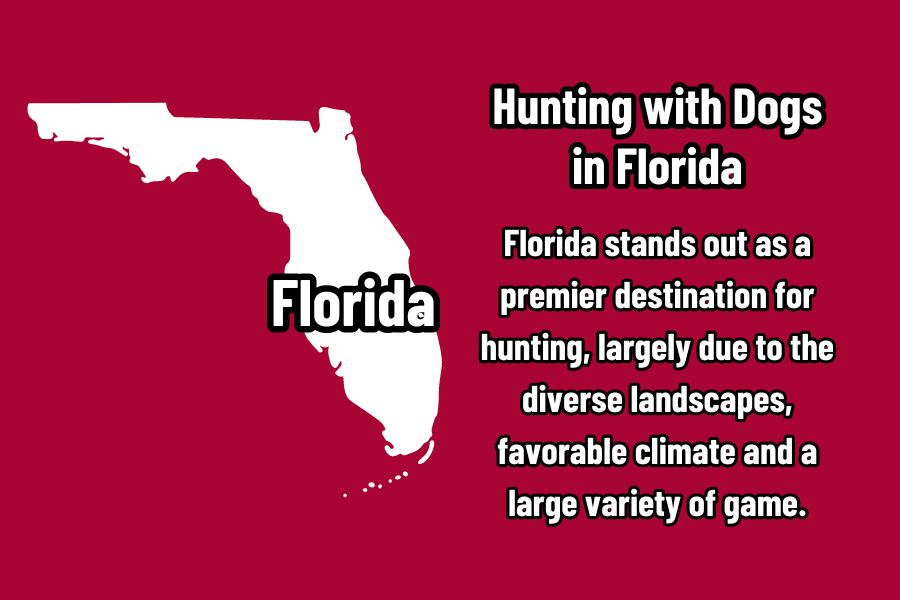Explore the ultimate guide to hunting with dogs in Florida. This comprehensive resource covers everything from key state regulations to the types of game mammals and birds you can hunt in Florida with dogs.
Introduction
In the early morning light, when the mist still clings to the marshes and fields of Florida, there’s nothing quite like the sound of your dog finding and following a fresh scent. This is the moment every hunter with their loyal companion waits for—an unspoken bond flourishing in the pursuit. For those who cherish these traditions, hunting with dogs in Florida isn’t just a pastime; it’s all about the hunter and dog deeply embedded into every hunt.
This guide acknowledges your thrill and dedication to the hunt. It’s crafted for enthusiasts like you, who not only seek the rush of the chase but also respect the spirit and regulations that define ethical hunting. From the thickets where whitetail deer roam to the coastal stretches where ducks take flight, Florida offers a diverse hunting landscape, ideal for your best hunting dogs at work.
Together, we’ll explore the many exciting opportunities of hunting with dogs in Florida. So, lace up your boots, get your faithful hound ready, and let’s begin.
Navigating Florida’s Hunting Regulations with Dogs

Exploring the verdant landscapes of Florida with your hunting dog by your side can be an exhilarating experience. However, to ensure that both the spirit of sportsmanship and wildlife conservation are upheld, it’s crucial to familiarize yourself with the Florida hunting regulations with dogs for various hunting scenarios. This section aims to clarify what is permissible and what practices are restricted to help you plan a lawful and ethical hunting trip.
Banned Practices for Hunting Dogs in Florida
Florida imposes specific restrictions to protect wildlife and ensure fair chase in hunting activities. Here are several practices that are strictly prohibited when hunting with dogs:
- It is illegal to use dogs for hunting wild turkeys at any time.
- All hunting dogs must wear collars with tags that clearly show the owner’s name and address.
- Dogs are not allowed on private lands for hunting without explicit written permission from the landowner.
- Dogs used to pursue deer, foxes, coyotes, and wild hogs must be under physical control and equipped with collars that have both GPS or telemetry for tracking and devices for behavior correction.
- It is a violation to engage in hunting from the rights-of-way of any roads, whether paved or not. Specifically, using dogs to cast from rights-of-way to chase wildlife is considered illegal.
- Hunting within most wildlife sanctuaries and parks is forbidden, whether with or without dogs.
- During closed seasons, it is prohibited to allow dogs to chase or disturb wildlife.
- The use of dogs to aid in taking deer with archery equipment or muzzleloaders during their respective seasons is banned.
Permitted Practices for Hunting Dogs in Florida
Conversely, several practices are allowed under Florida law, which can enhance your hunting experience while ensuring you remain compliant with legal standards:
- Dogs may assist in hunting game mammals, birds, wild hogs, and furbearers unless specific local or state rules specify otherwise.
- Leashed dogs can be used to track wounded game mammals in all hunting seasons.
- When hunting with dogs, including using bird dogs or retrievers, the dogs must wear collars with the owner’s contact information. Additionally, hunters must carry written permission from landowners to hunt on their property with dogs.
- In private areas, dogs can freely chase rabbits, raccoons, opossums, skunks, nutrias, beavers, coyotes, wild hogs, foxes, and bobcats throughout the year.
- Remote tracking and behavioral correction devices are mandatory for dogs not under direct control when pursuing deer, wild hogs, foxes, or coyotes. It is unlawful to remove or tamper with these devices without the owner’s consent.
- Training for deer dogs is permitted during off-seasons, provided the dogs are leashed and managed directly by their handlers. However, it is illegal to take deer or other wildlife with firearms during these training sessions.
- Deer hunters using dogs on private properties must register with the Florida Wildlife Commission (FWC) at no cost. This registration should include a unique number on the dogs’ collars, and hunters should carry a copy of this registration during hunting seasons.
- On private lands, bird dogs may be trained using non-lethal methods such as blank pistols or banded pen-raised quail during closed seasons.
- Trapping or shooting foxes is not allowed. They may be legally chased with dogs year-round, providing a unique and challenging hunting experience.
When hunting with dogs in Florida it’s crucial that you understand and follow these rules and regulations to preserve the sport for future generations. In addition, you should always verify current regulations for any updates.
Hunting Game Mammals in Florida

Hunting game mammals in Florida offers a rich variety of habitats. In this section we dive deep into the diverse opportunities and regulations associated with hunting these species. We’ll also explore how hunting with dogs in Florida plays a crucial role in some hunts for game mammals, while it’s restricted or prohibited in others.
Hunting Whitetail Deer in Florida
Whitetail deer are the most sought-after game in Florida, thriving in the varied landscapes from dense forests to grassy marshes. The deer hunting season varies by region and method, with specific periods designated for bow hunting, muzzle loading, and general gun use. Hunting licenses are required, and management area permits may also be necessary depending on the location.
Dogs can be used to track wounded deer or to drive deer towards hunters in permitted areas during designated seasons. However, the use of dogs is regulated, and it’s essential to follow local guidelines to ensure a legal and ethical hunt. Deer hunting with dogs is a tradition in many parts of Florida, offering a unique challenge for you and your dog.
Key Deer in Florida
The Key deer is a delicate part of Florida’s wildlife, being an endangered subspecies found only in the Florida Keys. As the smallest North American deer species, the Key deer’s survival is threatened by habitat loss and human encroachment. Due to their protected status, hunting Key deer is illegal. Conservation efforts focus on habitat preservation and reducing human-wildlife conflicts to ensure their populations remain stable.
Hunting Gray Squirrel in Florida
The gray squirrel is a common sight throughout Florida, known for its agility and playful nature. These squirrels are primarily found in wooded areas where mature trees provide food and shelter. The squirrel hunting season typically runs from the fall through early winter, and while a general hunting license is required, this sport is accessible and favored among beginners and seasoned hunters.
Hunting gray squirrels with dogs may not be a common method for some hunters. But a well trained dog can help locate and retrieve squirrels adding more excitement to the hunt.
Hunting Rabbit in Florida
Florida’s rabbits, including the Eastern cottontail and the marsh rabbit, offer year-round hunting opportunities. These species adapt well to a variety of habitats but are commonly found in areas with dense cover such as brushy fields and wooded edges.
Using dogs to hunt rabbits is a longstanding tradition that enhances the hunting experience. Beagles and other small hounds are particularly effective, using their keen sense of smell to flush out rabbits and chase them into the open. Rabbit hunting with dogs is a dynamic activity that tests both the hunter’s and the dog’s skills.
Sherman Fox Squirrel
The Sherman fox squirrel, characterized by its larger size and distinctive coloration, is considered a species of special concern in Florida. Like the Key deer, the Sherman fox squirrel is protected due to significant habitat loss and degradation. Hunting these squirrels is not permitted, and conservation efforts are focused on preserving their remaining habitats and promoting awareness of their ecological importance.
Black Bear in Florida
Currently, Florida does not have an open season for hunting black bears, reflecting shifts in management practices aimed at conservation. The state’s black bear populations are monitored closely, and any future hunting seasons would be regulated to ensure they do not adversely affect the bear’s numbers or well-being.
Panthers in Florida
The Florida panther, an iconic symbol of wild Florida, is protected under the Endangered Species Act. With only a small population remaining in the wild, primarily in the southern part of the state, it is illegal to hunt or disturb panthers. Efforts to preserve their habitats and increase their population are critical to their survival.
In summary, hunting with dogs in Florida for game mammals offers a traditional and exciting way to engage in the sport. It’s crucial to respect the regulations and protected statuses of certain species to maintain the ecological balance and the continuation of these hunting practices.
Hunting Resident Game Birds in Florida
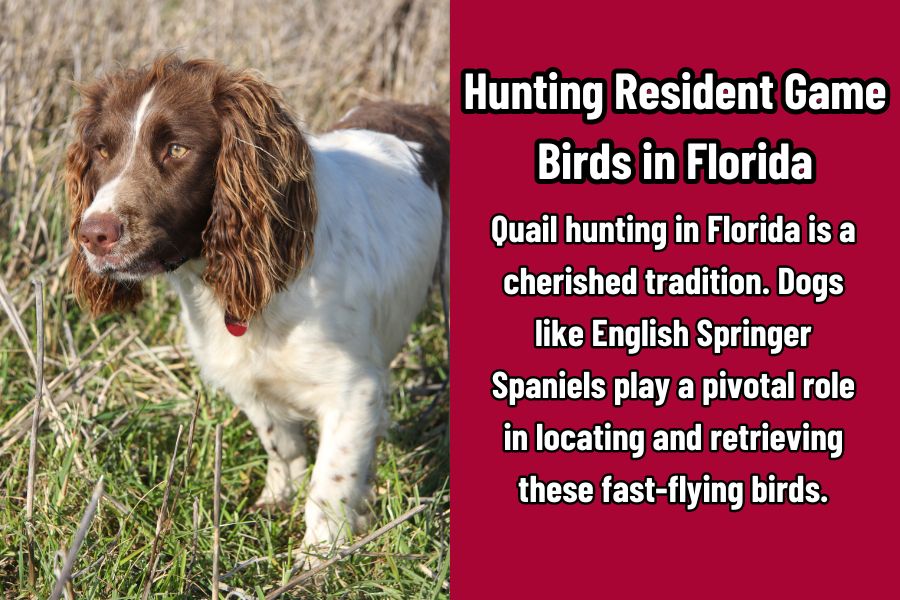
Florida’s diverse ecosystems provide a perfect backdrop for hunting resident game birds, offering opportunities for both novice and seasoned hunters. In this section we’ll cover intriguing facts, useful insights and much more about how hunting with dogs in Florida for game birds can be a thrilling experience.
Hunting Quail in Florida
Quail hunting in Florida is a cherished tradition, drawing enthusiasts who appreciate the challenge of these fast-flying birds. Bobwhite quail, the most common species, thrive in the mixed pine and scrubby flatwoods that blanket much of the state. These areas provide excellent cover and food sources, creating ideal quail habitats.
The quail hunting season typically runs from November to March, ensuring hunters can enjoy the cooler months outdoors. A valid hunting license and management area permit are required if hunting in one of Florida’s Wildlife Management Areas (WMAs).
Dogs play a pivotal role in quail hunting. Their ability to scent and flush out quail not only increases the efficiency of the hunt but also adds a layer of excitement and partnership that is deeply valued in the hunting community. Pointers and setters are particularly favored for their skills in locating and indicating the presence of quail without disturbing them.
Hunting Turkey in Florida
Turkey hunting is another popular pursuit in Florida, especially challenging due to the cunning nature of the turkey. Florida is home to two subspecies: the Eastern turkey, found throughout much of the state, and the Osceola turkey, which is endemic to the peninsula and highly sought after by trophy hunters.
The turkey hunting season varies depending on the subspecies and the part of the state, with spring seasons generally focusing on gobblers (male turkeys). All turkey hunters are required to have a valid hunting license and a turkey permit. Additionally, if hunting on a WMA, a management area permit is also necessary. Dogs cannot be used to hunt wild turkey.
Hunting Migratory Birds and Waterfowl in Florida
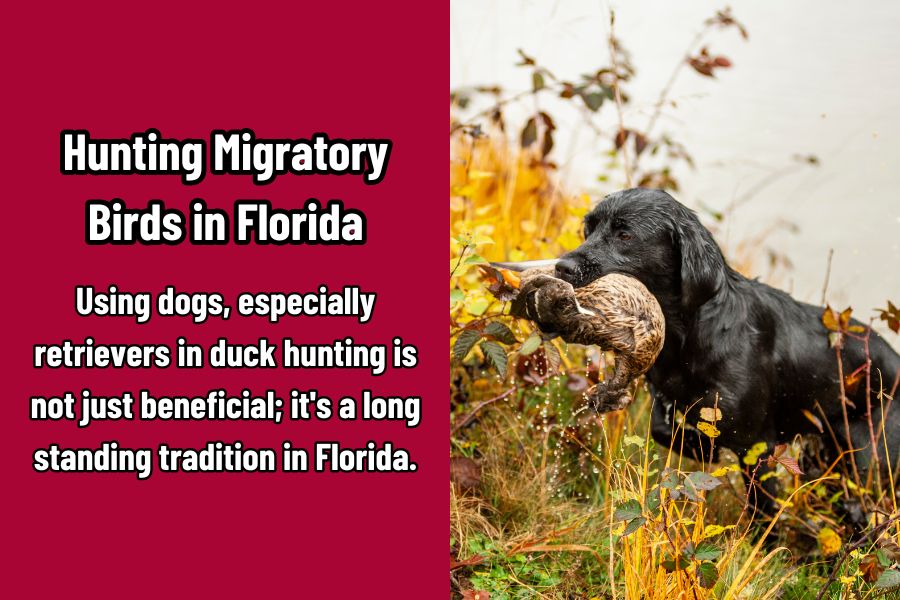
Hunting migratory birds in Florida with dogs is a one of kind hunting experience. Extensive wetlands, rivers, and coastal areas make Florida a haven for migratory bird hunters. From the thrill of duck hunting to the precision required for hunting snipe, we’ll cover each specie, habitats, licensees, seasons and some intriguing facts.
Hunting Ducks in Florida
Florida stands out as a premier destination for duck hunting, largely due to the diverse landscapes, favorable climate and a large variety duck species available to hunters. Each species offers unique characteristics and behaviors, enhancing the hunting experience. Here’s a closer look at some of the duck breeds you might encounter:
- Redheads – These medium-sized diving ducks are distinguished by the males’ striking cinnamon-red heads, black breasts, and light gray bodies, contrasting with the plain brown hue of females and ducklings.
- Buffleheads – Known scientifically as Bucephala albeola, these small sea ducks are notable for their vivid black and white coloring, with males displaying green and purple iridescent heads. Females are characterized by a modest white patch on each side of their heads.
- Lesser Scaup – Often called lesser bluebills, these medium-sized diving ducks feature males with mostly black coloring and paler backs, while the females are uniformly brown.
- Greater Scaup – Also known as greater bluebills or Aythya marila, these larger ducks can reach up to 33 inches in length and are identified by their distinct blue or yellow eyes.
- Goldeneyes – Recognizable for their golden eyes and yellow feet, male goldeneyes have a slightly greenish head, whereas females boast darker brown heads.
- Canvasbacks – The largest in their genus, canvasbacks are large diving ducks with red eyes, white bodies, and brown heads, making them particularly striking.
- Pintails – Recognized by their elongated, pointed tail feathers, pintails, or Anas acuta, feature males with rich chestnut coloring and females in mottled brown.
- Gadwall – Known as Mareca strepera, gadwalls are medium-sized ducks with understated grey plumage, measuring between 18-22 inches as adults.
- Ring-necked Ducks – These ducks are identifiable by the males’ glossy black heads and yellow eyes set against their white breasts, while the females are grey with dark eyes.
- Red-breasted Mergansers – Known scientifically as Mergus serrator, these diving ducks are distinctive for their spiky crests and long, thin red bills, typically measuring 20-24 inches in length.
- Blue-winged Teal – Known scientifically as Spatula discors, males display a distinctive white facial crescent that contrasts with their greyish and blue features, while females are mottled brown with a noticeable white area near the bill’s base.
- Green-winged Teal – The Anas carolinensis is a small dabbling duck, notable for its chestnut head and green eye patch, measuring just 12-15 inches in length.
- Wood Ducks – Also known as Carolina ducks, Aix sponsa, these ducks are celebrated for their colorful plumage; males are vibrant and multi-colored, while females display a more subdued, speckled pattern.
Seasons for duck hunting in Florida Hunting vary but generally align with the migration patterns, typically starting in early October and extending into January. Hunters must possess a Florida hunting license and a Federal Duck Stamp, and adhere to the bag limits and regulations set by the Florida Fish and Wildlife Conservation Commission.
Using dogs, especially retrievers in duck hunting is not just beneficial; it’s a long standing tradition in Florida.
Hunting Geese in Florida
In Florida, the primary species of geese available for hunting are the Canada goose and various types of light geese, including Snow, Blue, and Ross’s geese. These birds typically inhabit open grasslands and wetlands, where they can be found grazing.
Geese hunting seasons are generally in the winter months, when these birds are most populous in Florida. Like duck hunting, hunters need a valid hunting license and a Federal Duck Stamp. The use of dogs is highly effective in goose hunting, where their skills in retrieving can significantly aid in managing downed birds, especially in watery or difficult terrains.
Hunting Woodcock in Florida
The woodcock, a small, elusive bird, offers a unique challenge due to its zigzag flight patterns. Florida’s woodcock season typically occurs in the late fall and winter, aligning with their migratory patterns. Hunters need a state hunting license and a migratory bird permit.
Dogs, particularly pointing breeds, are invaluable in woodcock hunting. Their ability to scent and point allows hunters to prepare for the sudden flush of the bird, making the hunt more productive and enjoyable.
Hunting Snipe in Florida
Snipe hunting in Florida is known for being particularly challenging due to the bird’s fast and erratic flight. Wet, marshy fields are the preferred habitats for snipe. The season usually extends through the winter months.
Using dogs in snipe hunting significantly enhances the experience, as these birds are often hidden in thick cover. Dogs help locate and flush out snipe, giving hunters a better chance at a successful shot.
Hunting Rails in Florida
In Florida, rail birds such as the King, Clapper, Sora, Virginia, and Coot, along with others like the Common Gallinule and Moorhen, thrive in the state’s lush marshes and wetlands. These birds, known for their elusive nature, make rail hunting a specialized sport that demands both patience and precision from hunters.
The season for hunting rails usually opens in early fall, when these birds are most active. Utilizing smaller, agile dogs like spaniels can greatly enhance the hunting experience. These dogs excel in navigating the challenging wetland terrain, adeptly flushing out rails and retrieving them from dense vegetation and muddy waters.
Hunting Dove in Florida
Dove hunting, involving Mourning and White-winged doves, is a popular sport in Florida due to the birds’ abundance and challenging flight patterns. The season generally starts in early September and can continue in phases over several months.
Dogs are useful in retrieving doves from open fields where these birds are typically hunted, saving time and effort in locating downed birds.
Hunting Crow in Florida
Crow hunting offers an opportunity for year-round engagement, with no specific season or bag limits. These intelligent and wary birds require strategic planning to hunt effectively.
Dogs may not play a traditional role in crow hunting but can assist in retrieving duties where and when allowed.
Keeping Your Dogs Safe from Alligators
If you are hunting with dogs in Florida…beware of Alligators! For your dogs protection and your protection when hunting near water bodies in Florida, it’s crucial to be vigilant about alligators. Alligators are not usually active or feeding in colder months. Regardless, always inspect the hunting area for signs of alligator activity before you allow your dog to retrieve a bird.
Furbearer Hunting in Florida
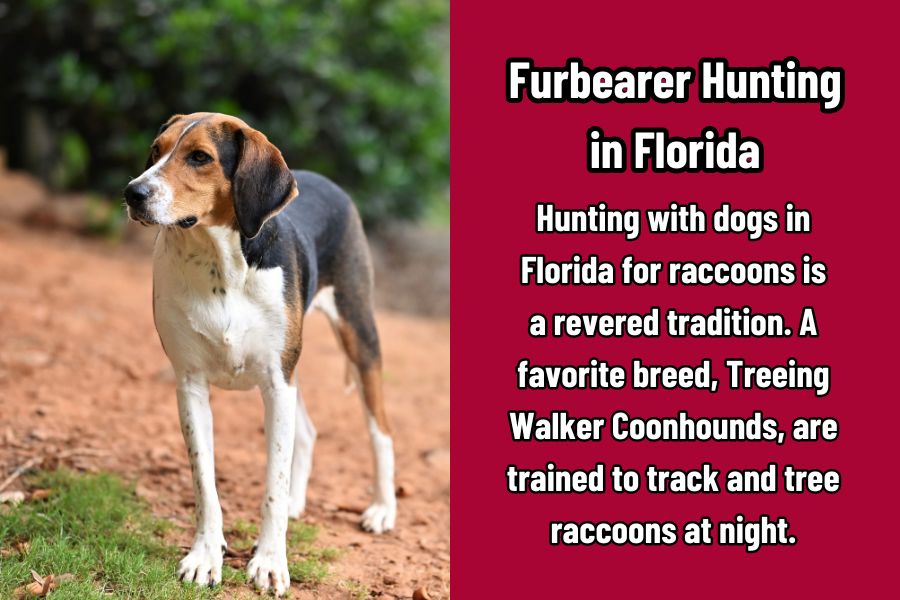
Furbearer hunting in Florida provides a dynamic and engaging outdoor activity for those interested in the pursuit of various mammals known for their valuable fur. This practice requires understanding the specific habitats, licenses, and seasons for each species, along with the regulations surrounding the use of dogs. Hunting with dogs in Florida for furbearing animals offers a unique blend of challenge and reward, making it a popular choice for hunters.
Hunting Otter in Florida
River otters in Florida are found throughout freshwater systems, swamps, and occasionally coastal areas. They are known for their playfulness and agility both in and out of water. Otter hunting season is typically during the winter months to early spring. A trapping license is required, and hunters must adhere to specific bag limits and trapping methods.
Dogs can assist in locating otters, particularly along riverbanks, by tracking their scent. However, due to the aquatic nature of otters, dogs play a more limited role compared to other furbearer hunts.
Hunting Raccoon in Florida
Raccoons are ubiquitous across Florida, thriving in both rural and urban areas. They are primarily nocturnal, making night hunting a common practice. The hunting season for raccoons runs year-round, and while a hunting license is required, there are generally no bag limits.
Hunting with dogs in Florida for raccoons is a traditional method. Especially coonhounds, are trained to tree raccoons, where the hunter can then legally harvest them. This method tests the skills of both the hunter and the dogs, fostering a strong partnership.
Hunting Opossum in Florida
Opossums, known for their ability to play dead as a defense mechanism, are another popular furbearer in Florida. Like raccoons, they can be hunted throughout the year, and there are no specific bag limits. Opossum hunting typically requires a standard hunting license.
Dogs are useful in opossum hunting for their ability to track and tree the animals, similar to raccoon hunting. This provides hunters with an effective strategy to locate and harvest opossums.
Hunting Beaver in Florida
Beavers in Florida are less common than in other parts of the United States, found mostly in the northern and central regions. They are known for their dam-building skills, which can impact local waterways. Beaver hunting is typically allowed during the cooler months, and a trapping license is required.
While dogs are not commonly used in hunting beavers due to the aquatic environment and the nature of beaver traps, they can help locate active lodges and dams.
Hunting Fox in Florida
Foxes in Florida, including the gray and red foxes, are known for their cunning and elusive nature. Although taking foxes by any method is prohibited, they may be chased with dogs year-round on private lands. This practice is primarily for sport rather than harvest, allowing dogs to engage in the chase without harming the fox.
This type of hunting tests the stamina and training of hunting dogs and provides a controlled environment to maintain the fox population.
Hunting Coyote in Florida
Coyotes have been increasingly spotted across Florida, adapting well to both urban and rural environments. Coyote hunting is open year-round, and there are no bag limits. A hunting license is required for hunting coyotes.
Using dogs in coyote hunting is effective as these canines can chase and corner coyotes, making them easier to manage. However, hunters must ensure that their dogs are well-trained to handle interactions with these often aggressive animals.
Hunting Bobcat in Florida
Bobcats are highly adaptable predators found throughout Florida, known for their beautiful fur and elusive nature. Bobcat hunting usually requires specific permits, and the season typically runs from December to March.
Dogs are particularly effective in bobcat hunting as they can track the elusive cat through various terrains. This hunting style requires skilled dogs that can maneuver and persist on the trail of a bobcat.
Hunting Skunk in Florida
Skunks are less commonly hunted in Florida but are occasionally targeted for their fur. Hunting skunks does not have a specific season, and typically a standard hunting license suffices.
Due to the nature of skunks, dogs are rarely used in their hunting to avoid the unpleasant defense mechanism skunks are known for.
Hunting Nutria in Florida
Nutria, large rodent-like creatures, are considered invasive in Florida and can be hunted year-round to control their population. No specific license is required beyond a general hunting permit.
Dogs can be useful in managing nutria populations, especially in areas where these animals are damaging levees or other water control structures. Dogs can chase and retrieve nutria in wetland areas, aiding in population control efforts.
Hunting Wild Hogs in Florida
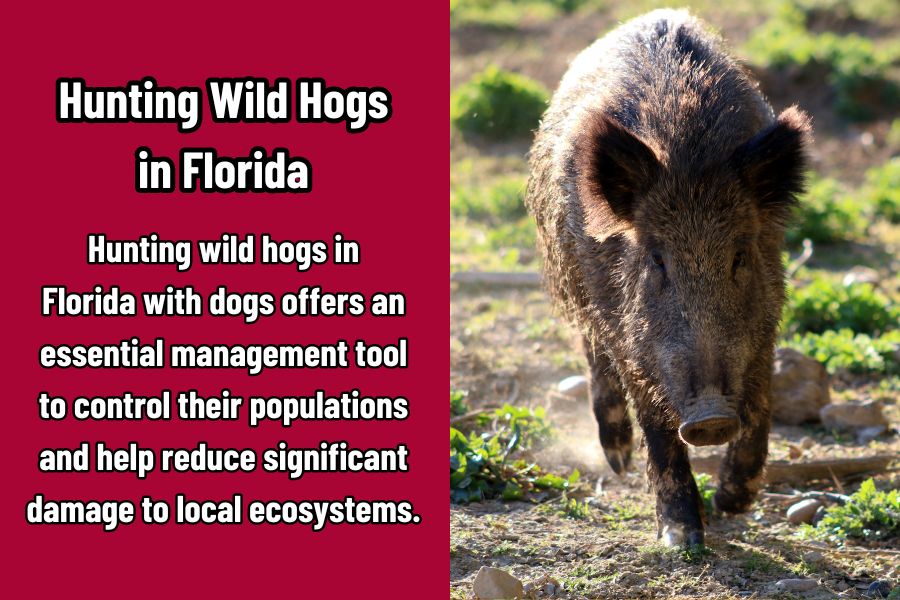
Hunting with dogs in Florida for wild hogs provide the perfect setting for one of the most challenging and exhilarating hunting experiences. These animals are not native to the state but have become widespread, resulting in significant impacts on local ecosystems. Hunting wild hogs in Florida offers an essential management tool to control their populations, and when conducted with dogs, it adds a dynamic and traditional element to the hunt.
Hunting Wild Hogs on Private Property
Hunting wild hogs on private property in Florida offers the most flexibility compared to other hunting activities. Landowners or those with landowner permission can hunt wild hogs year-round, day or night, without the need for a hunting license. There are no bag or size limits, and various methods, including the use of firearms, bows, and traps, are permitted. However, it is important to note that live hogs cannot be transported without a Feral Swine Dealer Permit issued by the Florida Department of Agriculture and Consumer Services.
Using dogs in the hunt for wild hogs on private property is particularly effective and popular. Dogs trained to track and bay hogs can significantly increase the success rate of the hunt. They can corner the hog until the hunter can safely and ethically take a shot, providing an adrenaline-pumping experience. It’s crucial, however, to ensure the safety of your hunting dogs, as wild hogs can be aggressive and dangerous, particularly when cornered.
Hunting Wild Hogs on Private WMAs
On public lands, specifically Wildlife Management Areas (WMAs), the regulations surrounding wild hog hunting are more structured. Wild hogs can be hunted in WMAs only during specified seasons which are detailed in the specific WMA regulations. Hunters must adhere to the permit requirements, and restrictions on the methods of take and bag limits may apply, depending on the WMA’s specific rules.
Hunting wild hogs in WMAs often does not allow the use of dogs except during certain seasons or under special conditions. This restriction helps manage the safety of all wildlife species and hunters due to the varied public use of these areas. For those interested in hunting wild hogs with dogs on WMAs, it’s crucial to consult the specific management area’s regulations to understand what is permitted.
Florida Hunting – General Information

Hunting in Florida offers a variety of opportunities for sportsmen and sportswomen, ranging from pursuing large game like deer and wild turkeys to engaging in the more nuanced hunting of furbearers and migratory birds. Understanding the following general information will help ensure you are both successful and compliant with state laws.
Hunter Safety Requirement
In Florida, safety is paramount. Anyone born on or after June 1, 1975, must complete a hunter safety course to purchase a hunting license that allows them to hunt independently. This requirement ensures that all hunters have the knowledge and skills necessary for safe and responsible hunting. Children under the age of 16 can hunt under adult supervision without completing the course. For those 16 and older who have not yet completed the course, there is an option to obtain a deferral when purchasing their hunting license. This deferral allows them to hunt under the supervision of a mentoring adult who must be at least 21 years old, providing an opportunity for learning in the field.
Hunting Licenses
Florida offers various licenses tailored to the type of game being hunted:
- Basic Hunting License: Required for anyone taking or attempting to take game or furbearing animals with methods other than trapping. This is the foundational license needed for hunting in Florida.
- Deer Permit: Necessary in addition to the basic hunting license for those targeting deer.
- Turkey Permit: Required for hunting wild turkeys, in addition to the basic hunting license.
- Migratory Bird Permit: Needed along with the basic hunting license for those who hunt migratory birds such as ducks, geese, and doves.
- Florida Waterfowl Permit and Federal Duck Stamp: These are required for hunting waterfowl species and are additional to the basic hunting license and migratory bird permit.
Each of these permits and licenses ensures that hunters are compliant with the state’s wildlife management objectives and conservation efforts.
Hunting Dogs
FWC Registration for Hunting Dogs
For those interested in deer dog training season and hunting deer with dogs, Florida has specific regulations. Deer hunters who use dogs on private properties must obtain a no-cost registration from the Florida Fish and Wildlife Conservation Commission (FWC). This registration is crucial during the deer dog training season and any open deer hunting season when dogs are used. It helps ensure that the use of dogs in hunting adheres to state regulations, maintaining the safety and ethics of the sport. This registration includes identifying information about the dogs and proof of the hunter’s permission to use the land, which must be available for verification upon request.
General Use of Hunting Dogs
Hunting in Florida with dogs—in general dogs can be used to aid in the hunting of game mammals, birds, wild hogs, and furbearers, except where local or state regulations explicitly prohibit it.
Wrapping Up Your Adventure
As we round off this guide on hunting with dogs in Florida, each specie we’ve covered offers a unique challenge.
Imagine the early morning mists, your dog by your side, both tuned into the serene wild calling. It’s more than just hunting; it’s about sharing moments, building bonds, and respecting the traditions.
Now’s the time to gear up, review what you’ve learned, and plan your next great outing. Florida’s diverse wildlife and rich hunting heritage are waiting for you. A hunting journey that promises more than just game—it offers memories that last a lifetime. Happy hunting with dogs in Florida!
FAQs – Hunting with Dogs in Florida
Do You Need to Purchase a License for Your Dog to Hunt in Florida?
Hunting with Dogs in Florida Answer:
In Florida, there is no requirement to purchase a hunting license specifically for your dog. However, hunters must ensure that they themselves are properly licensed, and in cases where dogs are used for hunting, such as deer or furbearer hunting, adherence to specific regulations concerning dog use is essential. This includes ensuring your dog is marked with identification and, for certain game like deer, having a registration from the Florida Fish and Wildlife Conservation Commission (FWC) during designated seasons.
Can You Hunt Furbearer in Florida with Dogs?
Hunting with Dogs in Florida Answer:
Yes, hunting furbearers with dogs in Florida is a popular and traditional method. Species such as raccoons, opossums, and foxes are commonly hunted with the aid of dogs. It’s important to note that while dogs can be used to chase foxes, they cannot be used to kill them; foxes may only be chased for sport. Ensure you have the appropriate hunting license, and be aware of the open seasons and any specific area restrictions.
Can You Hunt Deer in Florida with Dogs?
Hunting with Dogs in Florida Answer:
Hunting deer with dogs is permitted in certain parts of Florida, primarily in the northern regions where large tracts of forested land make it a viable method. This practice is regulated tightly to ensure safety and ethical hunting practices. Hunters must obtain a no-cost deer-dog registration from the FWC during the open deer hunting seasons and adhere to specific management area regulations. This method is steeped in local tradition and adds a communal aspect to deer hunting.
Can You Hunt Wild Hogs in Florida with Dogs?
Hunting with Dogs in Florida Answer:
Yes, wild hogs can be hunted with dogs across Florida and this method is quite effective given the challenging nature of hog hunting. There are no specific season restrictions or bag limits on private lands, and dogs can be used year-round to track and bay hogs, although the final take must be done by the hunter. When hunting on public land, such as Wildlife Management Areas (WMAs), the use of dogs may be restricted to certain times and requires adherence to specific regulations.
Can You Hunt Game Birds and Migratory Birds in Florida with Dogs?
Hunting with Dogs in Florida Answer:
Dogs play a crucial role in hunting game birds and migratory birds in Florida. They are extensively used in hunting waterfowl, doves, and quail. For migratory birds like ducks and geese, hunters must ensure they have the required migratory bird permit in addition to a general hunting license. Dogs enhance these hunting experiences by retrieving birds and sometimes flushing them towards the hunters, making these outings both efficient and enjoyable.
What is the Most Common Duck Hunted in Florida?
Hunting with Dogs in Florida Answer:
The most common duck hunted in Florida is the Blue-winged Teal. Known for its early migration patterns, the Blue-winged Teal arrives in Florida as early as September, making it a popular target for early-season waterfowl hunters. These ducks are admired for their speedy flight and are often hunted in the wetlands and marshes across Florida, where dogs are used to retrieve downed ducks from water, showcasing their invaluable support in waterfowl hunting.
Resources – Hunting with Dogs in Florida
“SPECIAL NOTE: The regulations, license information, best practices, species, and other key information provided in this post are based on research using the Resources listed below. The information provided is subject to change without notice. Therefore all hunters should always verify current information published by the Florida Fish and Wildlife Conservation Commission”.
For more comprehensive information about hunting with dogs in Florida, the following resources will be invaluable:
- Hunting with Dogs in Florida FWC – Hunting in Florida
- Hunting with Dogs in Florida eRegulations – General Information
- Hunting with Dogs in Florida eRegulations – Florida Hunting Regulations
- Hunting with Dogs in Florida eRegulations – Welcome to 2023-24 Florida Hunting
These links provide direct access to the latest guidelines, rules, and essential information for ensuring a legal and ethical hunting experience in Florida.
Start planning your trip to go hunting with dogs in Florida. Also check out our other posts about hunting with dogs in…
Alabama
Alaska
Arizona
Arkansas
California
Colorado
Connecticut
Delaware

